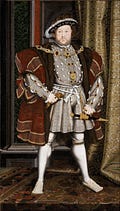In yesterday’s post, we embarked upon series of readings of classic texts to see if they might give us some fresh ways to consider what is at stake in the forthcoming presidential election. I made the claim that all literature is inevitably political, despite the complaints of some who would rather not think of such things, and that the values espoused by most of our historically important writers would lead us to support the candidacies of Kamala Harris, Tim Walz, as well as Democratic candidates down the ballot. We began by looking at the work and life of Madame de Staël, her rejection of misogyny, and her advocacy for the freedom and education of women.
Today, we will jump forward two centuries to the work of the great English writer Hilary Mantel and, specifically, to her final novel, which charts the last years of the life of Thomas Cromwell and his service to that most infamous of monarchs: Henry VIII. Mantel narrates the dangers, all too relevant to us these days, of a leader who is what we would now call a malignant narcissist.1
Hilary Mantel
Hilary Mantel's The Mirror and the Light, the third and final novel in her Cromwell trilogy, dropped in March of 2020. By this time, I had been waiting for it for almost a decade, having read the first two books, Wolf Hall and Bring Up the Bodies, multiple times. I was convinced that Mantel had essentially invented a new way to write fiction, and I was trying to find some angle to discuss what she was doing in my own critical writing.
The time of the novel's release was perfect for me, since my university was about to begin its spring break, and I was looking forward to a glorious week of immersive reading.
Within a couple of days, however, you know what happened. Lockdown.
The Mirror and the Light was a victim of bad timing: this is a novel filled with death, disease, and decline, and it also focuses on a king who is descending further into paranoia and narcissistic resentment. Appearing as it did, alongside COVID and a mafia-clown-wannabe-dictator president in the US (and a prime minister in the UK who rivaled him both with his incompetence and his mendacity), it struck a bit too close to home. Also, Cromwell learns, as plenty have of Trump since 2016, that everyone close to the king is in danger, subject to the caprice of a monstrous ego. This did not make for comfortable, or even enjoyable reading in 2020.
Upon rereading, however, it becomes apparent that this book frames itself totally differently from its predecessors, and so the reader should not approach it expecting simply a sequel. This should not be surprising to readers of Mantel, a novelist who could never be accused of writing the same novel twice, so various and wide-ranging has been her output. While Wolf Hall was a long, immersive exploration of an historical moment and a singular consciousness, and Bring Up the Bodies was almost thriller-like in its focus on the fall of Anne Boleyn, The Mirror and the Light is a novel haunted by the ghosts of Henry’s former victims: Anne, George Rochford, Henry Norris, Catherine of Aragon, Thomas More, Bishop Fisher, the martyred gospellers, the fallen monasteries. While one might argue that some of these deserved what came to them, it was the whim of the king rather than justice that determined their respective fates. The Pilgrimage of Grace, the great uprising in the north that for a time seemed as though it might bring Henry down, is a reminder, however, that alternatives to the Tudors would not necessarily have improved things. Is social chaos to be preferred over tyranny? Will it lead to another the rise of another tyrant? These are the sorts of bleak questions that this book leaves us with.
But Cromwell himself is, of course, the through-line, though this is a different Cromwell from the brash, rising man of Wolf Hall or the terrifying but somehow lovable power-broker of Bring Up the Bodies. This Cromwell is not only older, but he is also newly reflective, as various aspects of his past begin to catch up with him—a dead boy from his youth in Putney, his long association with the dead Cardinal Wolsey, his vivid childhood memory of watching a woman burn to death. His memory is filled with death as the shadow of his own death emerges to haunt him.
The imminent reason for these hauntings is the monstrosity that is Henry and his increasing paranoia, grievance, and vindictiveness as he ages. Cromwell, perhaps too late, begins to understand the costs of serving a narcissistic leader, even if one approaches this service with the best of intentions—assuaging the king's ego while attempting to shape policy for the better.
The parallels between Henry VIII and Trump are all too clear, though there are, of course, some important differences. The nature and scale of Henry's power allowed him to rid himself of his enemies through execution—or judicial murder. Trump was not able to do this, though his recent remarks about General Milley deserving execution for his criticism of the former president show us that he longs for this kind of power. His indifference to the murder by Saudi agents of journalist Jamal Khashoggi during his presidency demonstrates that he thinks that those who speak truth to power simply get what's coming to them if they are murdered.
However, the fact that many of Trump's former colleagues, whom he now brands as enemies, are still around and are warning us of the dangers of restoring him to power, tells us something about his malignant narcissism. He now calls these people "enemies from within" and has promised retribution to all who challenge him.
Of course, the other essential difference is that the people of 16th-century England did not have the power to rid themselves of Henry. We, on the other hand, the citizens of the United States, have the power to reject malignant narcissism and instead to elect Kamala Harris and Tim Walz—real leaders who are dedicated to service rather than to having others serve them
It's time to vote.
Thanks for reading, from my fancy internet voting booth to yours.

Some of the prose that follows is derived from this earlier post from 2023.





Excellent article! One point: DJ Trump is not the intellectual that Henry VIII was, even by the standards of the sixteenth century.
Hey John! Re. Trump and Henry, you’ll be interested in a stack I co-wrote with with Dr. Simon Rogoff and a little piece I wrote years ago, in the early Trump days. The stack:https://open.substack.com/pub/susanbordo/p/trumps-two-bodies?r=384ha&utm_campaign=post&utm_medium=web. The piece: https://bordocrossings.com/the-little-king/